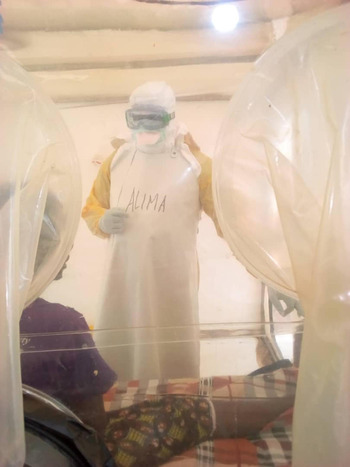In November 2018, the Ebola virus epidemic in North Kivu and Ituri in the Democratic Republic of the Congo (DRC) became the second-largest epidemic of Ebola virus disease and the second deadliest in history, behind that in West Africa from 2014 to 2016.1 Despite progress in treatment, as of 24 March 24 2019, the epidemic has caused 634 deaths out of 951 confirmed and 65 probable cases; a mortality rate of 62.40%.2 This tenth epidemic of Ebola virus in the DRC was officially declared on 1 August 2018, only 1 week after the declaration of the end of the ninth epidemic, 1200 km away. Although the World Health Organization (WHO) did not report the epidemic as a public health emergency of international concern, regionally, the WHO considered the risk associated with the Ebola virus spreading as ‘very high’.1 Concern is starting to reach neighbouring countries and many are considering the possibility of a global epidemic, since the spread of the Ebola virus in cities such as Butembo, with a population of 1.2 million people.1,Reference Gostin, Kavanagh and Cameron3,Reference Nuzzo and Inglesby4
To counter the epidemic in this region, teams of doctors, nurses, hygienists and many who specialise in various trades, risk their lives in attempting to treat those infected by the Ebola virus every day. In Ebola treatment centres, the ill suffer both physically and psychologically because they are plagued by the fear of death as well as hurt by the distress and rejection of others. As patients deal with the agony of physical pain caused by the disease, the psychological pain that accompanies it can be terrifying for patients who cannot be supported by their loved ones.
Almost every day since the beginning of the North Kivu epidemic, people have died in treatment centres. Every newly deceased individual causes an increase in anxiety for those who are receiving treatment and their caregivers. Therefore, in these situations, patients cry and often say that they feel as if they are losing their minds in this isolated space, in which they are in constant proximity to death. Although the biosecure emergency care units (CUBEs) for outbreaks currently used to treat patients decrease physical isolation, the psychological isolation that they experience in the face of death remains.
Amid the health professionals who work to help the ill in coping with suffering and death are psychologists. As displayed in Fig. 1, psychologists are not working in offices, but are literally at the bedside of the patient. Whether dressed in overheated outfits to be closer to the ill who cannot see their faces, or dressed in street clothes to work with them from outside their CUBE, with the risk of breaking confidentiality, these psychologists also risk their lives both for those who will die and those who will survive.

Fig. 1 Picture taken in Beni (North-Kivu). A clinical psychologist in session with a patient with the Ebola virus disease.
In this Ebola treatment centre in Beni (Fig. 1), psychologists see patients two to three times a day and are there to respond to their distress and anxiety attacks, for which medical treatments against the Ebola virus disease can do nothing. While accompanying the dying has never been easy for mental health professionals, the current Ebola outbreak differs from the situations they are used to with patients with cancer or even HIV/AIDS in the 1980s and 1990s. This is a virus that, despite precautions, healthcare workers are constantly at risk of catching. As of 24 March 2019, 78 healthcare workers had caught the Ebola virus, resulting in 27 deaths. It is often by becoming aware of their own fear that psychologists try to work with the ill to diminish their fears and those of their family members, while attempting to relieve the acute trauma symptoms of the Ebola virus disease. Psychologists also support other health professionals, health support staff and safe and dignified burials teams who face the daily death of patients in the centres.
The consequences of Ebola on the mental health of survivors, families, communities and members of the response teams are plentiful; therefore, the work of these psychologists is crucial. This work is especially essential in a region where violence and war constitute interpersonal trauma on a national and regional level. For this to work, it is important that studies be conducted to observe community strategies and mechanisms of resilience and coping. Cultural factors also need to be considered to better understand and develop culturally sensitive intervention programmes. These studies must also develop resources to assist governments and communities to be better equipped to prevent subsequent epidemics. These are global mental health and public health actions we must begin as soon as possible to help communities cope in a country that is in dire need of mental health professionals.
Until this research is established, the results are known, and programmes are based on solid evidence and real needs of the communities, the work of these mental health professionals at the feet of Ebola virus should be acknowledged – it is part of the humanisation of the fight against the Ebola epidemic.
Funding
This article was supported by grant 108968 from the International Development Research Centre.




eLetters
No eLetters have been published for this article.